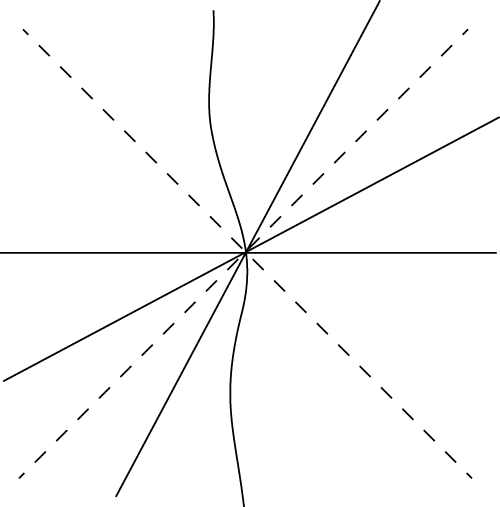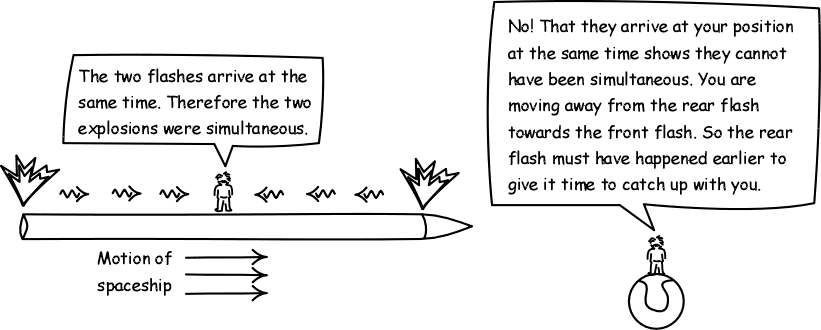A. Questions for Submission
3.1 Spacetime Diagrams
Label the following parts of the diagram below: (a) timelike worldlines; (b) spacelike curves; (c) lightlike curves; (d) inertial trajectory; (e) hypersurface of simultaneity for the inertial trajectory:

3.2 Visualising the Relativity of Simultaneity
Suppose an observer on a spaceship judges two flashes to be simultaneous, while an observer on Earth does not, as illustrated in the diagram below.

- Draw a spacetime diagram illustrating the Earth observer's worldline at rest.
- In the same diagram, draw the worldlines for the front and the back of the spaceship.
- In the same diagram, draw a hypersurface of simultaneity for the ship, and indicate the locations of the two flashes on that hypersurface.
- Use the diagram to explain the different judgements of the spaceship observer and the Earth observer about whether or not the flashes occurred simultaneously.
3.3 Presentism
- Give a clear statement of the meaning of 'presentism'.
- What problem does special relativity pose for presentism?
- Does special relativity support eternalism instead?
- Can you imagine any alternative view?
B. Further Discussion (No Submission)
Further views on presentism
- Katherine Brading (optional reading) argues that presentism is an empirical question, in that it must be settled by experiment. In your view, is this correct?
- John Norton (optional reading, "The Burning Fuse") argues that presentism and eternalism are equally problematic, suggesting a sense in which the entire debate is misguided. Is he correct?
- Have a look at Hinchcliff's paper (optional reading) and evaluate his "point present" model.
Spacetime and simultaneity
Consider two events E1 and E2 below. One event is the birth of a person in London, and the other is the birth of a person in Paris. The events are illustrated in each of the spacetime diagrams below.

- Draw the worldline of an observer that judges the London and Paris births to occur at the same moment, in that E1 and E2are simultaneous. Then draw a hypersurface of events that A will judge to be simultaneous which passes through E1. Explain how the diagram illustrates the two events occur simultaneously.
- Draw the worldline of an observer that judges the London baby to be born before the Paris baby, so that they do not have the same birth-time, or possibly not even the same birthday.
- Explain how the concept of `having the same birthday' is observer-relative. Is a lesson of relativity thus that 'everything is relative'?